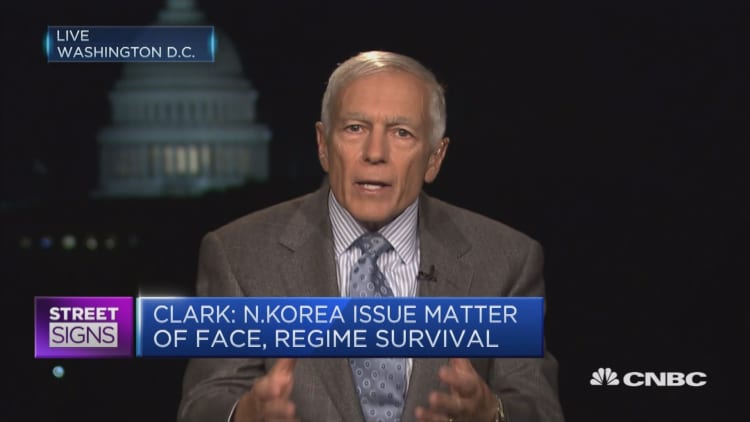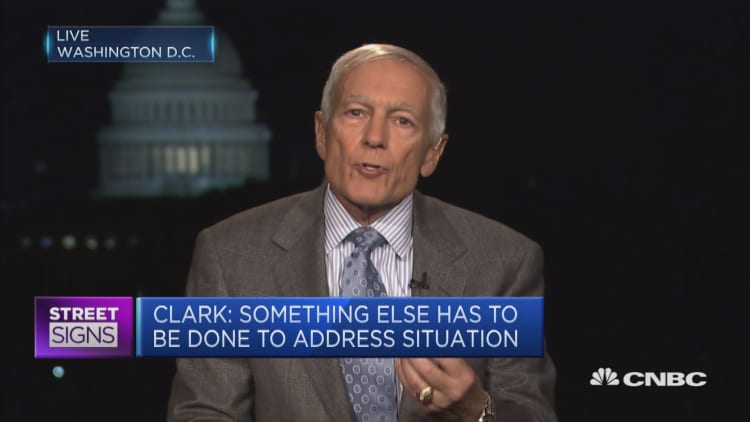
With U.S. prodding, the United Nations on Monday agreed to further limit global trade with North Korea following the country's most powerful nuclear test ever.
Although the new sanctions are bound to further squeeze Pyongyang's economy, many analysts expressed skepticism that the United States and its allies could bring the rogue state back into negotiations.
In fact, conventional multilateral talks are not the answer to the North Korea tensions, said Wesley Clark, former NATO supreme allied commander.
That means the countries who have thus far headed the international response to North Korea's provocations, including the U.S., China and Russia, must stay away from the dialogue table — at least publicly.
Instead, the world needs complex negotiations mediated by a neutral third party, Clark said. And the key to the success of those talks lies in keeping them secretive, he added.
Why traditional talks won't happen
The North persisted with its provocative weapons testing despite an earlier round of UN sanctions, issued in August, by launching a missile over Japan and conducting a nuclear test in September.
It is likely to respond to the latest sanctions with more weapons trials, according to Byoung-Joo Kim, adjunct professor at Hankuk University of Foreign Studies.
"The problem is the more the U.S. wants to add pressure, the more North Korea wants to respond with greater pressure," Clark told CNBC.
And both countries are unlikely to engage in dialogue at the same time as they are toughening up on the other party, according to the former NATO commander.
Crucially, the parties' consideration of public perception limits the options they can take to resolve the tensions. At the current stage, showing a willingness to talk will make the countries "look weak," causing the opposing side to be less willing to concede, Clark said.
Furthermore, negotiations might be fundamentally ineffective in bringing a resolution to the crisis because both the U.S. and North Korea cannot offer what the other wants, according to Clark.
"The objectives of the two sides seem to be directly contradictory," he said.
"North Korea wants the U.S. out [of the region], a guarantee they won't be attacked, and to handle South Korea on their own, presumably through intimidation, pressure and conflict if necessary."
Those goals, if achieved, could threaten regional peace and security, which is exactly what Washington and Seoul want to avoid, he added.
Send in the neutrals
Publicly recognition as the first party to open the door to dialogue could cost the U.S. and North Korea bargaining power in their ongoing tug-of-war — but the countries can take a back door route to resolving the crisis, Clark said.
"What is needed is someone behind the scenes who ... while publicly both sides ratchet up the pressure, is working to find a solution that meets both parties' near-term objectives and provides a road map to the future," the former commander said.
"But it has to be done privately, quietly, without any fanfare," he added.

Such a solution could take the form of a multi-year program that moves toward normalization, and involves a non-NATO mediator such as Sweden or Finland, according to Clark.
"You might have someone from the Middle East who's an experienced U.N. negotiator, a man like [Algerian diplomat] Lakhdar Brahimi who's very well known for going into crisis situations," he said, adding that the intermediary could also take the form of "any number of retired former foreign secretaries or presidents and prime ministers of countries" that have had relations with the two countries.
North Korea last participated in multilateral talks in 2005, when it reached an agreement with the United States, South Korea, China, Japan and Russia to suspend its nuclear program in return for diplomatic benefits and energy aid.
The negotiations collapsed in 2008 after Pyongyang refused access to compliance inspectors, which led to the imposition of further sanctions.
The latest round of UN trade restrictions imposes a cap on oil exports to North Korea at current levels, and bans Pyongyang's economically important textile exports.

